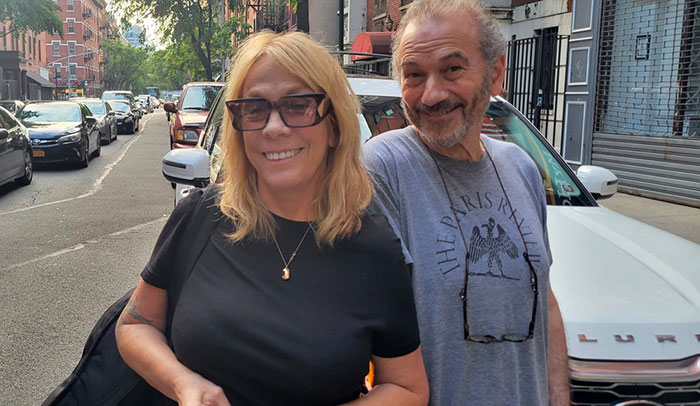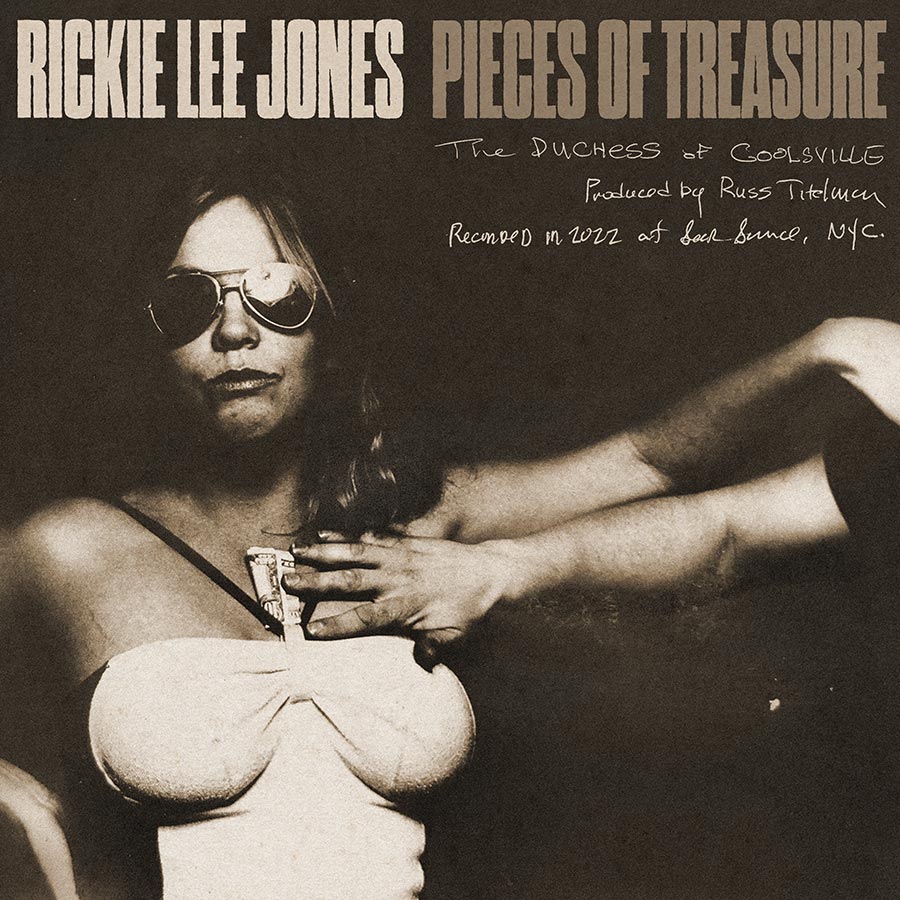Rickie Lee new album is out now. Pieces of Treasure (BMG Modern Recordings), a reunion with her lifelong friend, legendary producer Russ Titelman, co-producer of Jones’ star-making debut and Pirates. Throughout her career, the Grammy-winning singer songwriter has interpreted an extraordinarily wide range of songs and has recorded celebrated jazz-leaning albums including Girl at Her Volcano and Pop Pop, but until now, she had never devoted an entire album to the American Songbook.
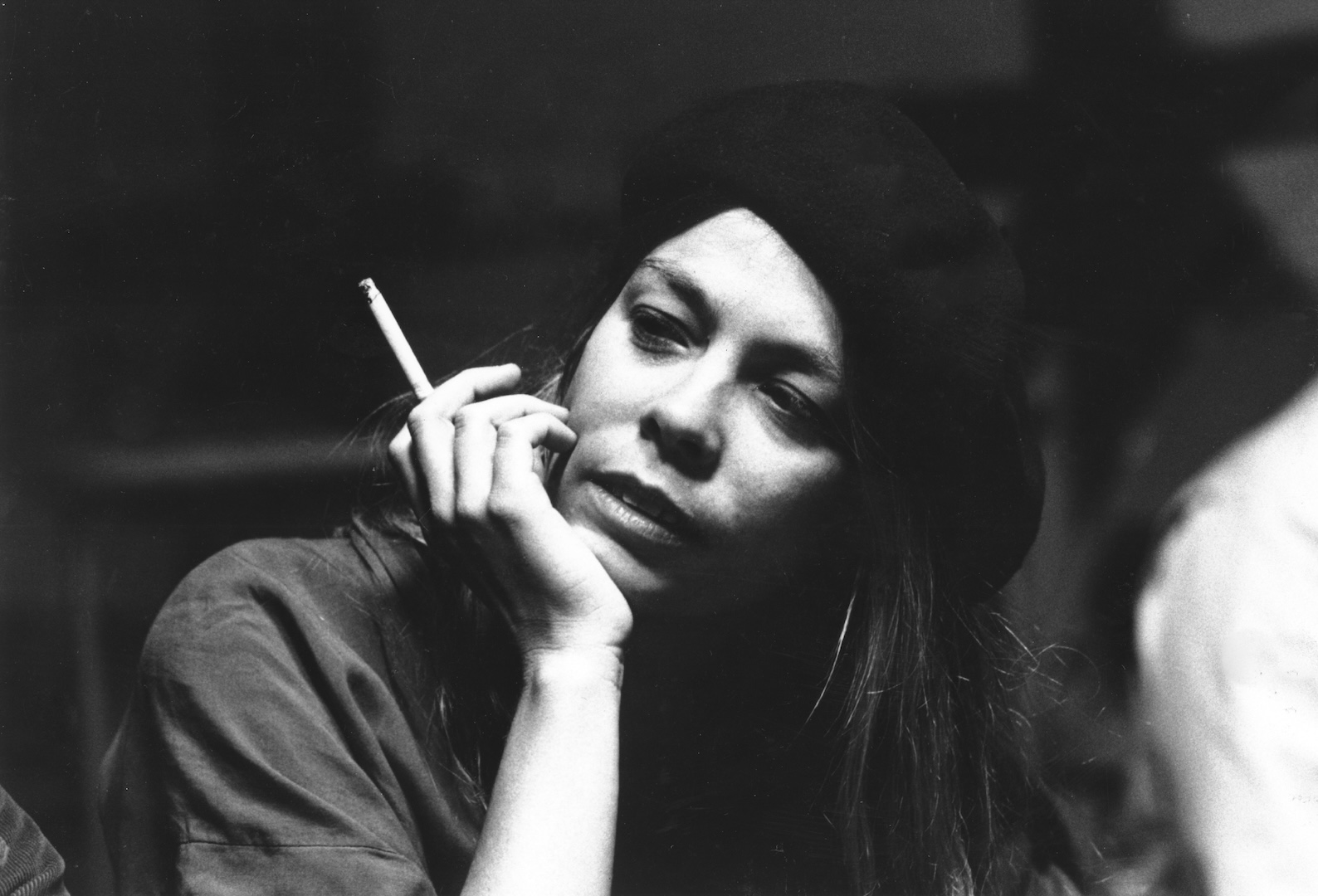

Pieces of Treasure
1. Just in Time (Jule Styne, Betty Comden, Adolph Green)
2. There Will Never Be Another You (Harry Warren, Mack Gordon)
3. Nature Boy (Eden Ahbez)
4. One for My Baby (Harold Arlen, Johnny Mercer)
5. They Can’t Take That Away from Me (George Gershwin, Ira Gershwin)
6. All the Way (Jimmy Van Heusen, Sammy Cahn)
7. Here’s That Rainy Day (Jimmy Van Heusen, Johnny Burke)
8. September Song (Kurt Weill, Maxwell Anderson)
9. On the Sunny Side of the Street (Jimmy McHugh, Dorothy Fields)
10. It’s All in the Game (Charles G. Dawes, Carl Sigman)
Pieces of Treasure (BMG Modern), Rickie Lee Jones’ newest album, has been a long time coming. In a career that has spanned more than four decades, the renowned singer songwriter has interpreted an extraordinarily wide range of songs from writers and artists she loves, often collected on the same album—showtunes, blues, folk, rock (David Bowie publicly praised her take on “Rebel Rebel”). She was nominated for a 1989 Best Jazz Vocal Performance Grammy for her rendition of “Autumn Leaves” from Rob Wasserman’s Duets album; a year later she won in the same category for her duet with Dr. John of “Makin’ Whoopee.” She has released the celebrated jazz-leaning albums Girl at Her Volcano and Pop Pop, but until now, she had never devoted an entire album to the American Songbook.
Pieces of Treasure —the title a callback to Jones’ seminal album Pirates— is a reunion with legendary producer Russ Titelman, who had, with former Warner Bros. Records head Lenny Waronker, co-produced her star-making 1979 debut LP Rickie Lee Jones and the follow up, Pirates. Titelman had followed Jones’ career over the many years since they’d last collaborated, faithfully going to hear her play whenever she came through New York City. They recently started having phone conversations and then meeting up for lunch; each time Titleman would tell her the same thing: “We’re going to make a jazz record. We’re going to make a jazz record.”

“It was really hard working with me on Pirates,” says Jones. “But this new album is about two friends, just two friends. I think we renewed a powerful and respectful friendship.”
Recorded over five days at Sear Sound in midtown Manhattan, backed by the quartet of Rob Mounsey on piano, guitarist Russell Malone, bassist David Wong and drummer Mark McLean, the music came easily. The result is intimate and elegantly simple, a deeply emotive set that feels as if it were pulled from Jones’ own life and experience as much as from the American Songbook. You can hear a few sobs at the end of closing track, “It’s All In the Game”: they’re real and they’re from Jones—she was as moved by that moment in the vocal booth as a listener undoubtedly will be. It is clear Rickie Lee Jones was born to sing jazz.
Titelman was beguiled by Jones’ voice and songs from the moment his long-time friend and colleague Waronker played him a demo of this young discovery. “Company,” the penultimate song on Rickie Lee Jones, had moved him to tears even in its demo form. That admiration has not diminished, as Titelman writes in the liner notes to Pieces of Treasure: “This American Songbook recording shows Rickie’s artistry in full bloom. Her voice has always sounded a bit younger than it ought to (that may be a function of her ability to inhabit the character who is singing the song so masterfully that you believe every word) but on this recording the aging voice sounds even better to me than the youthful one. There’s a resonance and warmth in her lower register that wasn’t there before. I adore the young Rickie Lee but I love even more the Old Dame.”
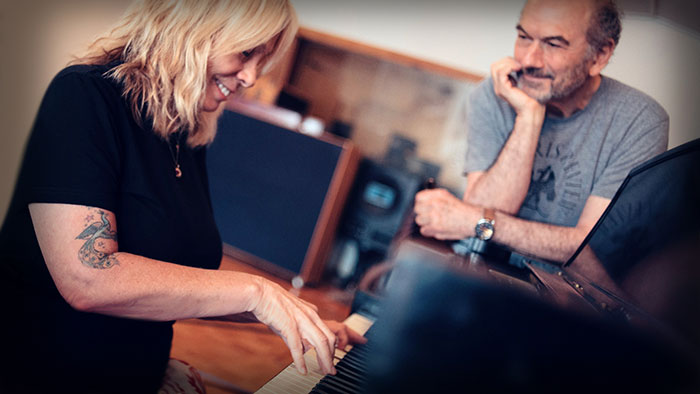
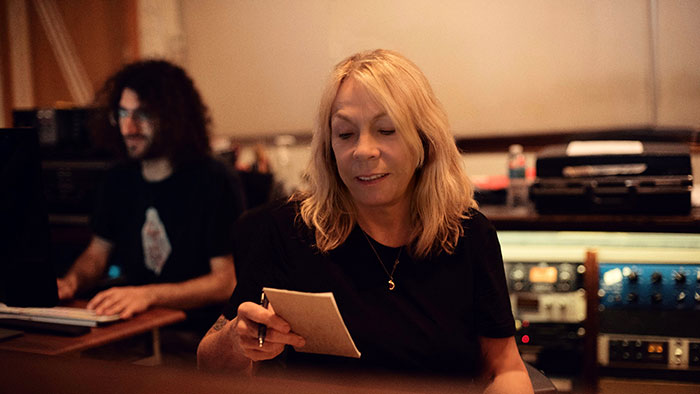
The sessions centered on Jones’ voice and her interpretative, almost actorly, gifts. As Jones puts it, “I was and am confident that the voice is the first and last message of a song.” Everyone else is there to help the singer convey the story of the song. Russ masterfully picked four players who are exceptional musicians and who also like to listen and respond. And that’s partly why this sparse thing sounds so totally complete, because everyone responds to each other and builds this perfect room.”
Jones’ vocal performances fill each track with pathos, longing, humor, romance. Pieces of Treasure is brimming with insight, if not outright autobiography. She is telling a story, playing a part, but the boundaries between artist and character continually blur until all you can hear is her emotional truth. Creating this work with a producer who was with her during the most turbulent and triumphant period of her career adds to its power. These two survivors, these two friends, have returned to where they started off together: making magic in a studio.
Titelman and Jones are used to the kind of emotionally exposed moments that have yielded astonishing music. In 1980, the famously arduous sessions for Pirates resulted in a brilliant album that Rolling Stone awarded a rare five-star review— and the magazine put Jones on its cover for the second time in two years. Back then, says Titelman, he and co-producer Waronker were more like “casting directors” for this young genius who could write, sing, arrange and conjure up a sweepingly cinematic version of her real life. All she had to do was bring players to complement her and keep the tape rolling. Following her debut, Time had dubbed her The Duchess of Coolsville and the name stuck.
Rickie Lee Jones’ recordings, starting with the hit “Chuck E.’s In Love” that launched her debut album, have all been like chapters in an evolving life story. Jones told a lot more of that tale, particularly those parts that predate her music career, in an acclaimed 2021 memoir, Last Chance Texaco: Chronicles of an American Troubadour, hailed by The New York Times for being “as rich and colorful as Jones’s best lyrics.” “She is a mercurial presence, impossible to pigeonhole or pin down, her songs as restless as her spirit,” writes The Guardian. “Reading her wild and wonderful book, one senses that, in a very real way, music was a calling that saved her life.”
“‘Give’ is the key word,” Jones decides. “When I was young it was about getting—it was about getting money, getting fame, getting the glory. At some point you have to get old enough to know—some kind of peace comes when you say, I’m going to give something to somebody. For me, I had to grow into that shape, where I felt I had something to give, that my job is only to give. There are lots of ways to sing a song. But…maybe what I possess is this imagination, and the ability to bring my imagination to others.”
